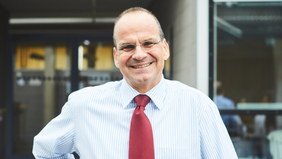The members of the Scientific Commission of the German Council of Science and Humanities combine scientific excellence with science policy expertise and experience. Professor Dr Christian Facchi, Research Professor for Embedded and Networked Systems at Technische Hochschule Ingolstadt and Head of the Graduate Centre, has been a member of the Scientific Commission of the Science Council since February 2020.
Now he has been confirmed in this office again for three years. This is outstanding in that there are 22 representatives of universities and research institutions on the Scientific Commission, but only three representatives of the universities of applied sciences. In addition, Facchi was appointed to the board of the body by Federal President Frank-Walter Steinmeier in February 2023 as a representative of the universities of applied sciences.
Only three representatives of the universities of applied sciences nationwide
"On some topics, our expertise is very much in demand because the majority of members do not have such deep insights into the specific processes at universities of applied sciences. My experience so far has been very positive because you are accepted as an equal member," says Professor Facchi. At several meetings, the committee members draft papers that make recommendations, such as on research funding at universities.
"I warmly congratulate Professor Facchi on his appointment to the Board of the Scientific Commission. He thus represents Ingolstadt University of Technology in an exemplary manner throughout Germany," says THI President Walter Schober.
Facchi has been a member of the Science Council since 2020 and has worked in various working groups on digitalisation in teaching and studies, perspectives on computer science, research funding or science communication. "What is particularly charming is that politics and science are on board together at the Science Council. It is a cooperation at eye level," says Facchi.
Background to the Science Council
The Science Council pursues the goal of enabling and supporting a high-performance, functionally and also institutionally differentiated science system that is interconnected in many ways and has a manifold impact on society. The Science Council is the highest advisory body in science matters to the Federal Government.
The Scientific Commission of the Science Council has 32 members. They are appointed by the Federal President, namely 24 scientists on the joint proposal of the German Research Foundation (DFG), the Max Planck Society (MPG), the German Rectors' Conference (HRK), the Hermann von Helmholtz Association of German Research Centres (HGF), the Fraunhofer Society (FhG) and the Leibniz Association, as well as eight public figures on the joint proposal of the Federal Government and the state governments.


![[Translate to English:] Logo Akkreditierungsrat: Systemakkreditiert](/fileadmin/_processed_/2/8/csm_AR-Siegel_Systemakkreditierung_bc4ea3377d.webp)








![[Translate to English:] Logo IHK Ausbildungsbetrieb 2023](/fileadmin/_processed_/6/0/csm_IHK_Ausbildungsbetrieb_digital_2023_6850f47537.webp)


